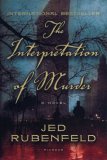Summary | Excerpt | Reading Guide | Reviews | Beyond the Book | Readalikes | Genres & Themes | Author Bio

Critics' Opinion:
Readers' Opinion:
First Published:
Sep 2006, 384 pages
Paperback:
Jun 2007, 450 pages
 Book Reviewed by:
Book Reviewed by:
BookBrowse Review Team
Buy This Book
Chapter One
There is no mystery to happiness.
Unhappy men are all alike. Some wound they suffered long ago,
some wish denied, some blow to pride, some kindling spark of
love put out by scorn—or worse, indifference—cleaves to them, or
they to it, and so they live each day within a shroud of
yesterdays. The happy man does not look back. He doesn’t look
ahead. He lives in the present.
But there’s the rub. The present can never deliver one thing:
meaning. The ways of happiness and meaning are not the same. To
find happiness, a man need only live in the moment; he need only
live for the moment. But if he wants meaning—the meaning of his
dreams, his secrets, his life—a man must reinhabit his past,
however dark, and live for the future, however uncertain. Thus
nature dangles happiness and meaning before us all, insisting
only that we choose between them.
For myself, I have always chosen meaning. Which, I suppose, is
how I came to be waiting in the swelter and mob of Hoboken
Harbor on Sunday evening, August 29, 1909, for the arrival of
the Norddeutsche Lloyd steamship George Washington, bound from
Bremen, carrying to our shores the one man in the world I wanted
most to meet.
At 7 p.m. there was still no sign of the ship. Abraham Brill, my
friend and fellow physician, was waiting at the harbor for the
same reason as I. He could hardly contain himself, fidgeting and
smoking incessantly. The heat was murderous, the air thick with
the reek of fish. An unnatural fog rose from the water, as if
the sea were steaming. Horns sounded heavily out in the deeper
water, their sources invisible. Even the keening gulls could be
only heard, not seen. A ridiculous premonition came to me that
the George Washington had run aground in the fog, her
twenty-five hundred European passengers drowning at the foot of
the Statue of Liberty. Twilight came, but the temperature did
not abate. We waited.
All at once, the vast white ship appeared—not as a dot on the
horizon, but mammoth, emerging from the mist full-blown before
our eyes. The entire pier, with a collective gasp, drew back at
the apparition. But the spell was broken by the outbreak of
harbormen’s cries, the flinging and catching of rope, the bustle
and jostle that followed. Within minutes, a hundred stevedores
were unloading freight.
Brill, yelling at me to follow, shouldered through to the
gangway. His entreaties to board were rebuffed; no one was being
let on or off the ship. It was another hour before Brill yanked
at my sleeve and pointed to three passengers descending the
bridge. The first of the trio was a distinguished, immaculately
groomed, gray-haired, and gray-bearded gentleman whom I knew at
once to be the Viennese psychiatrist Dr. Sigmund Freud.
At the beginning of the twentieth century, an architectural
paroxysm shook New York City. Gigantic towers called skyscrapers
soared up one after the other, higher than anything built by the
hand of man before. At a ribbon-cutting on Liberty Street in
1908, the top hats applauded as Mayor McClellan declared the
forty-seven-story redbrick and bluestone Singer Building the
world’s tallest structure. Eighteen months later, the mayor had
to repeat the same ceremony at the fifty-story Metropolitan Life
tower on Twenty-fourth Street. But even then, they were already
breaking ground for Mr. Woolworth’s staggering fifty-eight-story
ziggurat back downtown.
On every block, enormous steel-beam skeletons appeared where
empty lots had been the day before. The smash and scream of
steam shovels never ceased. The only comparison was with
Haussmann’s transformation of Paris a half century earlier, but
in New York there was no single vision behind the scenes, no
unifying plan, no disciplining authority. Capital and
speculation drove everything, releasing fantastic energies,
distinctly American and individualistic.
Copyright © 2006 by Jed Rubenfeld





The House on Biscayne Bay
by Chanel Cleeton
As death stalks a gothic mansion in Miami, the lives of two women intertwine as the past and present collide.

The Flower Sisters
by Michelle Collins Anderson
From the new Fannie Flagg of the Ozarks, a richly-woven story of family, forgiveness, and reinvention.

The Funeral Cryer by Wenyan Lu
Debut novelist Wenyan Lu brings us this witty yet profound story about one woman's midlife reawakening in contemporary rural China.
Your guide toexceptional books
BookBrowse seeks out and recommends the best in contemporary fiction and nonfiction—books that not only engage and entertain but also deepen our understanding of ourselves and the world around us.